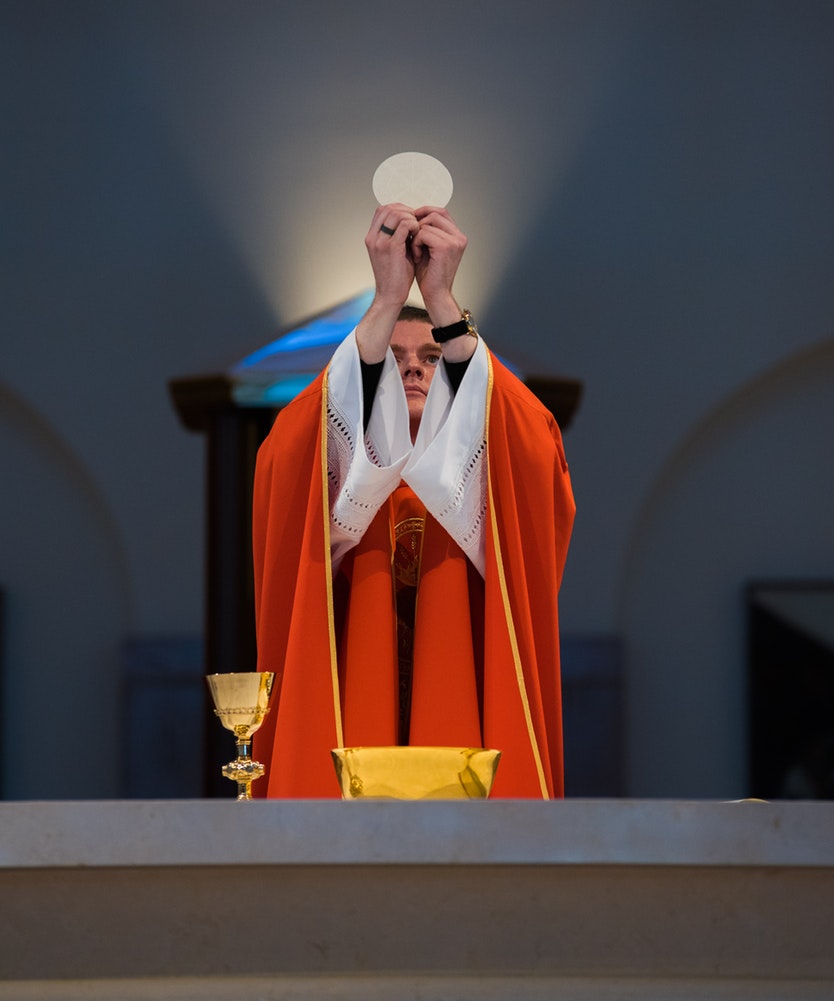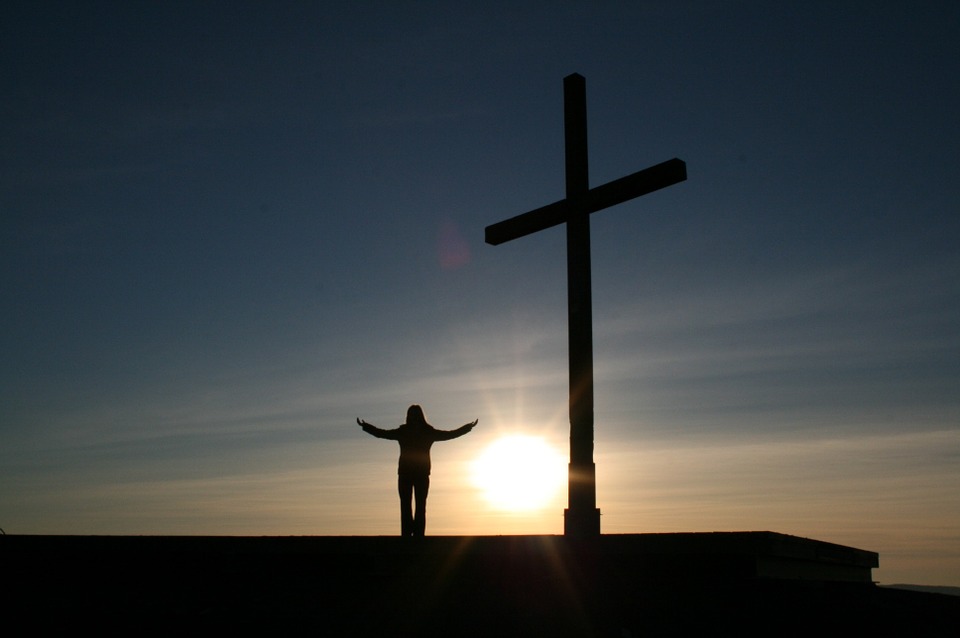The Old Law
Now if perfection had been attainable through the Levitical priesthood
for under it the people received the law), what further need would there have been for another priest to arise after the order of Melchizedek, rather than one named after the order of Aaron? For when there is a change in the priesthood, there is necessarily a change in the law as well. For the one of whom these things are spoken belonged to another tribe, from which no one has ever served at the altar. For it is evident that our Lord was descended from Judah, and in connection with that tribe Moses said nothing about priests. This becomes even more evident when another priest comes in the likeness of Melchizedek, who has become a priest not on the basis of a legal requirement concerning bodily descent, but by the power of an indestructible life. For it is witnessed of him, ‘You are a priest forever, after the order of Melchizedek.” On the one hand, a former commandment is set aside because of its weakness and uselessness (for the law made nothing perfect); but on the other hand a better hope is introduced, through which we draw near to God. Hebrews 7:11-19
evident when another priest comes in the likeness of Melchizedek, who has become a priest not on the basis of a legal requirement concerning bodily descent, but by the power of an indestructible life. For it is witnessed of him, ‘You are a priest forever, after the order of Melchizedek.” On the one hand, a former commandment is set aside because of its weakness and uselessness (for the law made nothing perfect); but on the other hand a better hope is introduced, through which we draw near to God. Hebrews 7:11-19
There remains among Christians today a great deal of misunderstanding regarding the necessity of the Old Testament Levitical priesthood with all of its sacrifices. Foremost in the mind of the author was the understanding that religion is nothing more than access into God’s presence—which is his theme from the beginning of his letter. He has shown us how our access to God has changed from the Old Testament system of priests and sacrifices to the New Testament understanding of Jesus as our sacrifice, High Priest, and eternal mediator between God and man.
In the Old Testament there were two ways one could maintain a relationship with God.
The first way was to obey all the laws and instructions of God. As long as man kept God’s laws there was peaceful fellowship between the Creator and His creation. But with the fall of Adam and Eve, it was understood that complete obedience to God’s holy law was going to be impossible for man to keep. Therefore a second way of relating to God was implemented, and this was the system of sacrifices and priests. When people disobeyed God’s laws, God required that they make a sacrifice for their sins. The Levites were set apart to do nothing more than keep this sacrificial system going so that the people could remain pleasing to God and have a continuing relationship with Him. But in fact, both man’s ability to keep the Law and the sacrificial system of restoring man to God’s graces proved ineffective, and perfection before God was once again understood to be impossible. There had to be another way. That way is Jesus.
Upon reading the passage currently under consideration, many wonder, If ‘perfection” could never have been obtained through the Old Testament law, why did God institute it in the first place? There are at least three reasons. First, the Law was given to show us that no matter what we do, no matter how many sacrifices we give, statutes we observe, foods we abstain from, days we honor, rituals we perform, prayers we repeat, dollars we tithe or people we forgive, we will never find true righteousness before God. Only God is holy, and we can never be holy before God based on our own efforts. Second, it was to prefigure the great ‘once for all” (10:10) sacrifice that was to be made by Jesus. Peter tells us that prior to the creation of the world, God decided to send Jesus as a sacrifice for our sins (1 Peter 1:20). The Old Testament system was instituted so that we would know that God is holy, that we are not, and that God would make a way for us to live holy in His presence. That way is Jesus. Third, the Law was meant to promote mankind’s awareness of sin, but never to deliver him from it. ‘So then, the law was our guardian until Christ came, in order that we might be justified by faith” (Galatians 3:24). There was a time when Paul thought that the Law could make him holy and acceptable in the sight of God. But after encountering Jesus, he went from being a Pharisee of Pharisees and legally righteous (see Philippians 3:5, 6), to recognizing himself as the worst of sinners (1 Timothy 1:15).
The purpose of the Law was to point to the fruitlessness of obeying it as a means of obtaining justification before God.
Since God created us, He knew that our main problem would not be external regarding the flesh, but internal regarding the soul and spirit. Therefore, the only true salvation that could be offered to us was one that came through a Savior whose qualifications were not according to the flesh regarding His ancestry, but by the Spirit regarding His character. Just so, our ability to stand in God’s presence today is based upon spiritual principles, not physical ones.
We must understand that Jesus is fundamentally different from all the priests who went before Him. Jesus is not a priest ‘on the basis of a legal requirement concerning bodily descent” (v. 16),  which is a translation that literally reads, ‘a law of fleshly commandment.” Although this is a broad application which includes His ancestry, Jesus’ qualifications as our High Priest had nothing to do with His ancestry or His fleshly qualifications to be a priest. And all the regulations that had to do with the priesthood pertained to the physical aspects of the priest. First, he had to be a pure descendant of Aaron. Furthermore, there were at least 142 physical blemishes that might disqualify him from serving the Lord. Some of these are listed in Leviticus 21:16-23. However, the new priesthood instituted by Jesus is based upon ‘the power of an indestructible life” (7:16), and not upon any physical attributes or acceptable ancestry.
which is a translation that literally reads, ‘a law of fleshly commandment.” Although this is a broad application which includes His ancestry, Jesus’ qualifications as our High Priest had nothing to do with His ancestry or His fleshly qualifications to be a priest. And all the regulations that had to do with the priesthood pertained to the physical aspects of the priest. First, he had to be a pure descendant of Aaron. Furthermore, there were at least 142 physical blemishes that might disqualify him from serving the Lord. Some of these are listed in Leviticus 21:16-23. However, the new priesthood instituted by Jesus is based upon ‘the power of an indestructible life” (7:16), and not upon any physical attributes or acceptable ancestry.
Rather than coming from the ‘acceptable” tribe of priests, Jesus ‘descended” (v, 14) from the tribe of Judah. Now, the Greek word used here for ‘descended” (anatetalken) was never used in the Old Testament for one who was a descendant of a particular tribe or family. Rather, it means rise or spring up, and may describe the rising of a star or the springing up of a shoot from the roots of a plant. This reminds us of our Messiah, who is a shoot from the root of David. Jeremiah 23:5 says, ‘Behold the days are coming, declares the LORD, when I will raise up for David a righteous Branch, and he shall reign as king and deal wisely, and shall execute justice and righteousness in the land.” David was the root from which Jesus rose as a branch, and as Jesus rose to be our supreme sacrifice, He also ‘set aside” the former commandment because of its ‘weakness and uselessness” (7:18). The Greek word for ‘set aside” is athetesis, and it means to annul a treaty, abrogate a promise, wipe a person’s name off a register, or render a law or a regulation inoperative. So now we see that Jesus did not descend into His place as our High Priest and sacrifice, but instead rose to meet its demands, and that through His sacrifice the old laws were annulled and wiped away, and a new way of relating to God has replaced it. This way is Jesus.
What this shows us is that we cannot stand in God’s holy presence based on how good we are.
We can only stand before Him because our faith in the work of Jesus has saved us from cashing in on all the wages of our sin. When God looks at us at the end of our lives and says, ‘By what right do you presume to stand before My Holy Presence?” the only acceptable answer that will justify our appearance before His throne will be, ‘By the application, through faith, of the blood of Jesus upon my sins. By Your grace, not by my own works.” Our response must ever be, ‘Lord, You did it all,” and must never be ‘Lord, didn’t I do . . . ?”
What the author of Hebrews is showing us is the completion of a relationship lost many thousands of years ago in a faraway land called the Garden of Eden. Verse 11 says, ‘Now if perfection had been attainable through the Levitical priesthood (for under it the people received the law), what further need would there have been for another priest to arise after the order of Melchizedek, rather than one named after the order of Aaron?” In this passage the word ‘perfection” is speaking to us about a relationship, not an experience. It is taking us to the place where perfection has to do with the judicial, life-giving aspect of a relationship, not just the experiences and practices of being perfect. The Greek word for perfection is teleiosis, and to the Greek-speaking people a thing was perfect if it carried out the purposes for which it was designed. As a system which removed our sins and gave us access to the presence of God, the Levitical priesthood and the Law upon which it was based fell quite short of the mark. The ‘gifts and sacrifices being offered were not able to clear the conscience of the worshiper. They are only a matter of food and drink and various ceremonial washings—external regulations applying until the time of the new order” (Hebrews 9:9, 10, NIV). This new order is the order of Melchizedek, with Jesus our High Priest and one-time sacrifice, where ‘by a single offering he has perfected for all time those who are being sanctified” (10:14). Faith in the atoning work of Christ has nothing to do with ‘food and drink and various ceremonial washings,” for a new order has been established by God in which the legal requirements of the Old Testament law and sacrifices have been annulled.
In verses 11-14, the author shows us that the Law and the priesthood were not two separate items which coincidentally happened to exist at the same time, but were interdependent. The Law was based on the continuing work of the priests from Levi’s tribe. Without the Levitical priesthood there could be no Law. Since Jesus is not from the tribe of Levi but from the tribe of Judah, then this change of priests necessitates a change of law, for without the priests the Law had no way of being effective in people’s lives. But Jesus was not another Aaron. He made one sacrifice and one only, and His ancestral tribe was not the priestly tribe of Levi, but the royal tribe of Judah.
Our application of this is simple: God sees us as righteous on the basis of faith in Christ, not on our descending from a Christian heritage.
David Du Plessis said, ‘God has no grandchildren.” We must all stand before God and give an account of ourselves. We cannot depend upon our family background and their relationship to the Lord to help us apply our own faith to our own relationship with God. We may have descended from 22 generations of preachers, but we must still bow our own knee and bless the Lord with our own lips. God is not interested in whom we are related to; He is interested in whom we are submitted to. We have to do more than believe in the ‘God of our Fathers”; we have to obey the Savior of our souls, and if we truly believe in the work of Christ, then we will show that belief in our obedience to His teachings. Belief without action shows we only have an opinion about God, not a saving relationship with Him. Every demon in hell believes in the one true God, but the only thing they do about it is get a supreme case of the shudders (see James 2:19)!
We now see that the finished work of Jesus completely replaced the old way that man approached God. Jesus was a new priest from a royal tribe, and since there is a change of priests there is now a change of law. The Old Testament law has been replaced with New Testament grace. Paul declared that times, seasons, places, and foods were all to be considered equal, without one day set above another. The only set day in the New Testament seems to be the day we remember the Lord in our service of Communion. Jesus has set us free from serving days and times and seasons, and now they are there to serve us, for ‘the Sabbath was made for man, not man for the Sabbath” (Mark 2:27).
